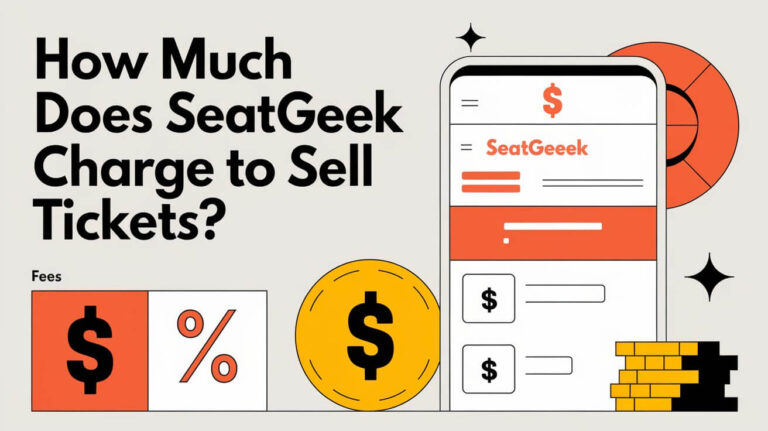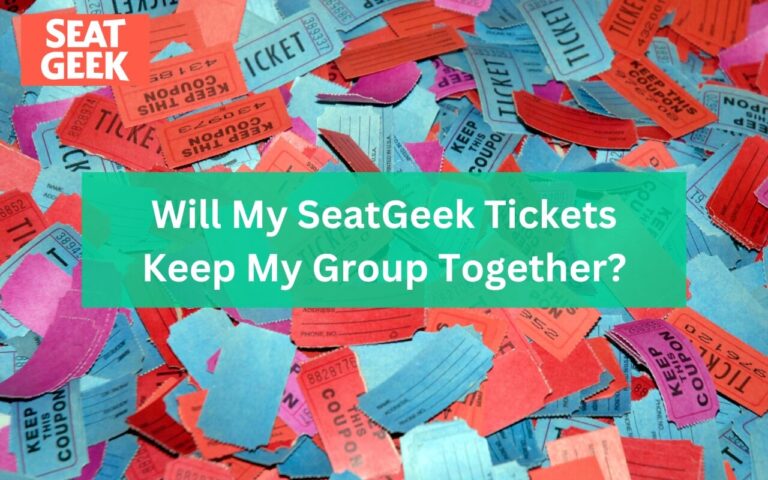
Are you tired of unexpected fees when buying tickets online? You’re not alone. In today’s world, finding out the real cost of tickets can be tricky. But, we’re here to shed light on SeatGeek fees and what they really mean.
SeatGeek is a big name in digital ticketing for sports and entertainment. But how do their fees compare to others? Let’s dive into SeatGeek’s pricing and see how they aim to offer a fair ticketing experience.
The Evolution of Digital Ticket Platforms
The ticketing world has changed a lot, moving from old ways to new digital ones. In 1993, Ticketmaster teamed up with America Online. This was the start of a big change in how tickets are sold.
From Traditional to Digital Ticketing
Now, most tickets are bought online. The U.S. online ticket sales are about $9 billion. This growth shows how digital platforms are now the top choice for buying tickets.
Primary vs Secondary Market Dynamics
The ticket market has two parts: the primary and secondary markets. The primary market sells tickets directly from teams or venues. The secondary market resells tickets, often by fans.
SeatGeek works in both markets. It sells tickets directly and also resells them. SeatGeek makes money by taking a cut of sales through its open API, SeatGeek Open. This API lets other companies use its platform.
Digital ticketing has brought new challenges and opportunities. Companies like SeatGeek and Ticketmaster compete for customers. Ticketmaster’s API is more exclusive, while SeatGeek’s is open to all. This competition affects how much tickets cost and the fees involved, which we’ll look at next.
How Much Are Seatgeek Fees
Buying tickets on SeatGeek can come with fees that add up. These fees change based on how popular the event is, how many tickets are left, and demand. SeatGeek shows all fees in the ticket price, making it clear for buyers.
Fees on SeatGeek usually range from 10% to 15% of the ticket cost. There’s also a delivery fee of $5 to $10 for electronic tickets. Taxes are added as a percentage of the ticket price and any fees.
Even though fees can vary, SeatGeek tries to keep prices competitive. The “Deal Score” feature helps buyers see the real value of tickets, not just the price.
| Ticket Type | Average Resale Price | SeatGeek Service Fee Range |
|---|---|---|
| Concert Tickets | $252 | 10% – 15% |
| Taylor Swift Tickets | $1,311 | 10% – 15% |
| Beyoncé Tickets | $480 | 10% – 15% |
| Bruce Springsteen Tickets | $469 | 10% – 15% |
SeatGeek has a fee calculator to help estimate costs. Remember, service fees are not refundable unless the event is canceled. But, SeatGeek often has promo codes that can lower costs.
SeatGeek’s clear pricing lets users compare without hidden fees. Verified sellers on the platform might offer lower fees, making it more affordable.
Service Fee Comparison with Other Platforms
The digital ticketing world is changing fast. It’s important to know how platforms like SeatGeek and StubHub charge fees. StubHub takes a 10% fee from buyers and 15% from sellers. SeatGeek’s fees change based on the event, artist, venue, and seat location.
SeatGeek’s fees can be higher for some tickets. But, they might also offer tickets below market price in some cases.
Seatgeek vs Stubhub Fee Structure
StubHub is big, with over 10 million tickets. They also have a fanprotect guarantee for last-minute buys. SeatGeek, on the other hand, is a search engine that aggregates tickets from many sites.
SeatGeek uses a Deal Score feature to help find good deals. Both platforms have mobile apps. But SeatGeek is known for its live chat customer service.
Market Competition Impact on Pricing
The ticket market is very competitive. This competition affects how much platforms charge. Ticketmaster, StubHub, Vivid Seats, and SeatGeek all adjust their fees to stay competitive.
A study found that fees range from 20.69% (Ticketmaster) to 37.66% (SeatGeek) of the ticket’s face value. Location also plays a part in pricing.
Hidden Cost Analysis
“Drip pricing” is when fees are revealed late in the buying process. This has raised concerns from consumers and regulators. A 2021 study showed it can increase spending by 21% compared to upfront pricing.
The U.S. government is taking steps. The House of Representatives passed the TICKET Act. It requires total prices to be shown upfront and bans resellers from offering tickets they haven’t bought.
Ticket fees can greatly affect what you pay. Knowing how different platforms charge can help you save money. It’s all about making informed choices.
Buyer and Seller Fee Breakdown
When you buy tickets on SeatGeek, you’ll see fees added to the ticket price. These seatgeek buyer fees can be 5% for cheaper events or up to 15% for pricier ones. Sellers pay a 20% seatgeek seller fees on each sale, which is more than StubHub’s 15% fee.
These fees can change how you decide to buy or sell tickets online. SeatGeek shows buyer fees upfront, making it clear. But, their higher seller fees might deter some from using the platform.
| Fee Type | SeatGeek | StubHub |
|---|---|---|
| Buyer Fee | 5-15% of ticket price | 10% of ticket price |
| Seller Fee | 20% of selling price | 15% of selling price |
| Delivery Fee | Varies based on delivery method and location (e.g., $10 + $5 minimum fee) | Varies based on delivery method and location |
Both SeatGeek and StubHub also have minimum and delivery fees. These can add to the cost for buyers and affect what sellers make. Knowing about these fees is key when using these platforms.
“The average ticket fee is now 27% of the ticket’s face value, with some fees as high as 37%.”
Price Display and Fee Transparency
In the world of event ticketing, price transparency is a big issue. Consumers often feel misled by hidden fees. SeatGeek stands out by showing the total cost, including fees, right away.
This approach makes SeatGeek different from others. Some competitors add fees later, which can surprise buyers. Lawmakers are also taking notice, with the U.S. House of Representatives passing the TICKET Act. This law aims to make prices clear and ban some reseller practices.
All-in Pricing Model
SeatGeek’s all-in pricing is a response to consumer complaints and legal issues. By showing the total cost upfront, SeatGeek wants to make buying tickets easier and more transparent.
Legislative Impact on Fee Disclosure
The push for transparency has led to laws like the TICKET Act. This law requires sellers to show the total ticket price, including fees, in ads and price lists. Sellers must also list the total price and each fee before you buy.
These changes could change how ticketing platforms like SeatGeek show prices. They come from consumer complaints and legal battles over hidden fees.
“The real price of a resale ticket for the Kraken vs. Stars game, after ticket processing and order processing fees, was $358 – an extra 22% on top of the advertised price.”
The ticketing industry is changing, with a focus on clear prices and fees. SeatGeek’s all-in pricing and laws like the TICKET Act aim to make buying tickets honest and trustworthy.
Platform Features Affecting Pricing
SeatGeek is a well-known ticket search engine with many features. One key feature is the “Deal Score.” It uses an algorithm to find the real value of a ticket. This helps buyers make better choices.
SeatGeek’s model lets it compare prices from different places. This can lead to lower prices for users. The platform also focuses on mobile apps and digital tickets. This can change the fees and total cost.
SeatGeek also partners with big sports teams and leagues. For example, it recently teamed up with Major League Baseball. These partnerships can make it easier for fans to get tickets to popular events.
| Feature | Impact on Pricing |
|---|---|
| Deal Score | Helps buyers determine ticket value |
| Aggregator Model | Enables price comparison across platforms |
| Mobile App and Digital Tickets | Affects associated fees and overall costs |
| Sports Partnerships | Influences ticket availability and pricing |
Knowing about these features can help users understand seatgeek pricing and ticket markup costs. This knowledge can lead to finding the best deals on tickets through SeatGeek.
“SeatGeek’s unique features, like the Deal Score and aggregator model, give users a distinct advantage in the ticket-buying process.”
Conclusion
SeatGeek’s fee structure is complex and changes a lot. The fees are shown in the ticket price, making things clear. But, it’s hard to compare these fees with others because they change a lot.
These changes come from the market, the event, and how competitive it is. This means fees can go up or down, depending on where and when you buy tickets.
Even with these changes, SeatGeek tries to keep prices fair. Sometimes, their fees are even lower than others. The ticketing world is always changing, with more openness in prices and possible new rules.
When picking a ticket service, think about more than just fees. Look at how many tickets are available, what features the platform has, and how easy it is to use. As more people buy tickets online, SeatGeek and others will have to keep their fees competitive and their service smooth.






